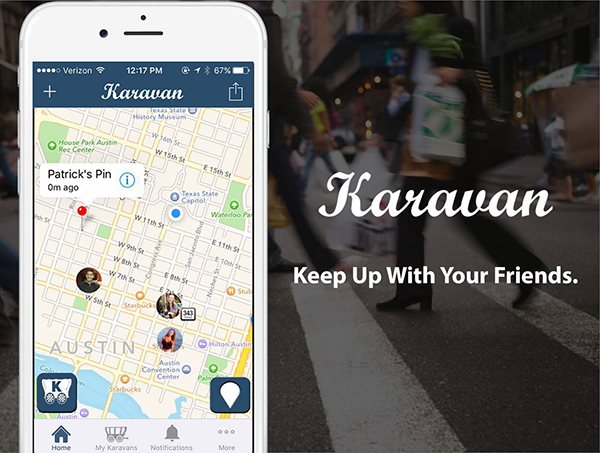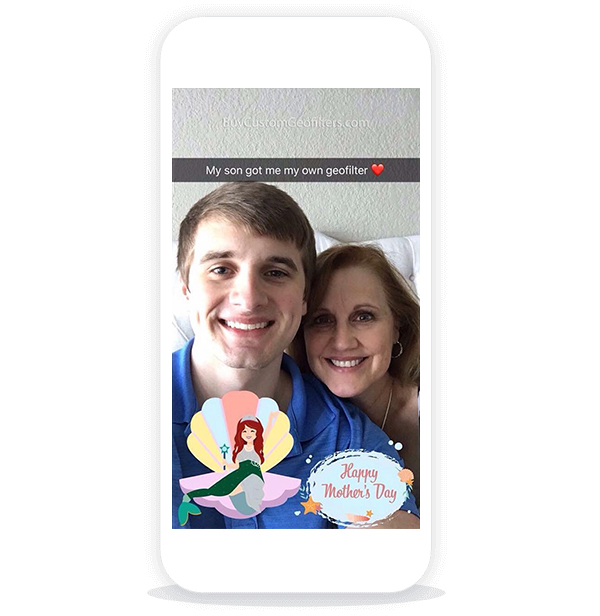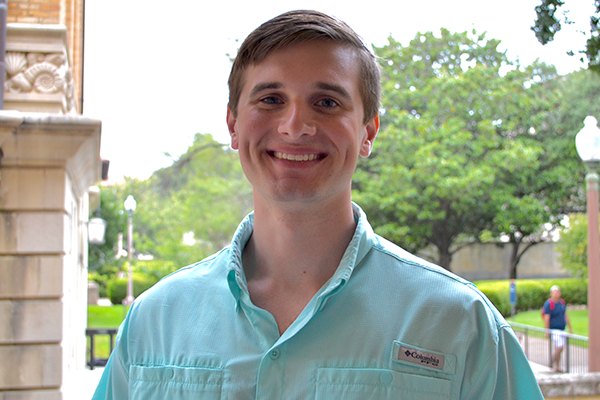In the spring of 2015, Andrew Lee attended a UT Austin lecture by Evan Spiegel, the founder and CEO of Snapchat, sponsored by the campus organization and professional business fraternity, Delta Sigma Pi. The experience made a major impression on the then-college freshman, and in a few short years, Lee’s own company would be collaborating with Spiegel’s.
“Getting to see someone who I admire that much on campus was incredible,” Lee said. “At the time, he was the youngest billionaire in the world, and we got to hear him speak and ask him questions. I will always associate that memory with UT, because truly, if it wasn’t for UT, I wouldn’t have had that opportunity. It’s as simple as that.”
In addition to being a full-time economics student, Lee, a junior from Houston, has multiple online businesses.
“I’ve been an entrepreneur my whole life, I think it’s just something I was born with,” Lee said. “When I was a little kid, I’d set up donut shops by all the neighborhood garage sales.”
Learning to Code
In 2015, Lee, who had developed an interest in tech, began teaching himself to code through YouTube videos and online tutorials. He estimates he spent a total of $50 on lessons.
“I think the coolest thing about coding is it’s always changing, so you really have to be paying attention and immerse yourself into it,” Lee said. “Or else you could spend all your time learning and they could change stuff up and what you just learned is irrelevant. So it’s very hard to become bored with what I’m doing, and I think that maps to my personality.”
With his coding knowledge, Lee created Karavan, a real-time location app on the iPhone that helps people easily meet up with friends no matter where they are. Users can drop pins on a map for everyone in their group to see, coupled with group messaging.

Filtering Success
Lee began advertising for Karavan with customized geofilters, a newly-launched feature on the photo, video and text messaging app, Snapchat. Geofilters are designs that frame a photo or video taken on Snapchat, specific to a certain location at a certain time.

For example, Lee was uploading his geofilter, which promoted Karavan, over 6th Street in Austin on the weekends. When people in the area opened Snapchat, they could scroll through the filters available there, from the generic ones showing the current time, temperature or location, to Lee’s custom geofilter advertising Karavan.
“I think my favorite geofilters were those early days with Karavan, and just waking up the next morning and seeing the data,” said Lee, who paid less than $10 for a geofilter that could net him upwards of 60,000 views. “It was really like Christmas, waking up to check the app downloads and seeing the exposure that these geofilters were getting. That was just the best feeling.”
Lee’s most successful venture to date, BuyCustomGeofilters.com, started in May 2016 as a side project. Although at the time custom geofilters were a relatively new feature, Lee’s experience advertising Karavan told him that they could also be a useful marketing tool to others.
To start, Lee was creating about 30 custom geofilters per month, all designed by himself. In time, the business has expanded to include more than 35 contracted designers in countries all over the world, including India, Morocco, the United Kingdom, as well as within North America. Under Lee’s management, the company’s current output is more than 300 geofilters per month, for clients ranging from individuals, to major corporations like Microsoft and IBM, to A-list celebrity parties in Hollywood.

With Lee’s service, customers only need to concern themselves with approving their custom-created design. That can include text, a caricature or cartoon based on photos the customer provides and more. Once the design in approved, Lee’s company maps out the address to ensure the location is correct and submits the design to Snapchat, charging a fee on top of Snapchat’s price.
In terms of affordability, Lee said that while it varies, individuals usually pay Snapchat about $20 per day to put a geofilter over a house or a small building for an event, such as a wedding or birthday party.

However, where there are large crowds of people, it gets pricey. Gone are Lee’s early day purchases of less than $10 for a night on 6th Street. Now, it could cost you upwards of $6,000 to add your own custom geofilter over, for example, Darrell K Royal-Texas Memorial Stadium during a UT football game. Or at a certain festival that takes place in Austin every spring.
“Last year at South by Southwest, it was crazy seeing all the geofilters there.” said Lee, who also runs UnofficialSXGuide.com. “If you were a tech brand, you weren’t really anybody if you didn’t have your own geofilter.”

Lee has also recently partnered with Snap, Inc. His company is developing a tool to help consumers create their own self-serve designs for a lower price and submit them directly to Snapchat from the BuyCustomGeofilters.com website, which wasn’t possible before the collaboration.
Geofilters for businesses, weddings and birthdays are BuyCustomGeofilters.com’s bread and butter, but there are also more unique requests. For example, some people are customizing geofilters for loved ones’ funerals or memorial services.
“Within a month or two of opening my business, someone requested a funeral geofilter,” Lee said. He was thrown at first, but that changed after he talked more with the client, who sent him pictures of their loved one and explained that the service would be taking place at a memorable spot for the person they’d lost. The whole neighborhood came to the event.
“It wasn’t a somber moment of all, it was a celebration of the man’s life,” Lee added. “Talking to this person completely changed my perspective.”
But of all the geofilter requests that he’s received, one for a proposal made him the most anxious.
It was not long after Lee had founded his website, and he was still designing all of the geofilters himself. A man approached him about creating a geofilter at the site where he was planning to propose, with a design that featured the text, “She said yes!” which made Lee a little antsy.
“I thought it was incredibly sweet, and the design turned out great,” Lee said. “But what if she said no, and they’re there, and the geofilter that says “She said yes,” is there?
“I was like, ‘Oh my God, if this goes bad, he’s going to look at that geofilter and look at me and my company as the worst memory ever,” he continued. “I have never wanted someone on the internet to say yes to a marriage proposal more in my life.”
The next day, Lee tentatively asked the client if his girlfriend had liked the filter. Fortunately, all had gone to plan and the client called him to tell him all about the details of the proposal, including that his now fiancée had loved the geofilter.

Education for an Entrepreneur
When Lee came to UT Austin, he knew he wanted to be an entrepreneur, but was unsure about which degree would help him accomplish his goals. After starting out in undergraduate studies, Lee switched to the economics department in the College of Liberal Arts.
As a junior, Lee is currently taking an economics statistics class taught by senior lecturer Valerie R. Bencivenga, which Lee said is extremely relevant to him.
“I am so excited about this class,” Lee said. “It’s essentially analyzing data and numbers, and taking out the statistical anomalies, which is what I do with my websites and e-commerce businesses. I think this is going to be a huge class for me and my life.”
Bencivenga explained why economics and entrepreneurship match up so well.
“An economics major provides frameworks for analyzing situations that may be relevant for entrepreneurs,” Bencivenga said. “Examples are predicting market behavior, and understanding how contracts can affect the composition of the applicant pool.”
She also has advice for Lee and fellow students interested in entrepreneurship.
“Use your time at UT to sharpen your critical thinking and reasoning skills, writing and communication skills, and quantitative and analytical skills,” Bencivenga said. “A few years after graduation, economics majors report on the value of these skills.”

Lee estimates that on top of his course load, he’s also working 30 hours per week on Karavan and 30 hours per week on BuyCustomGeofilters.com. He often works out of his studio apartment in West Campus, though he’s also been known to work on campus, especially in the Perry–Castañeda Library. He jokingly calls the second floor of the PCL, which is open 24 hours, his “office.”
Lee has advice for anyone wanting to start their own business.
“Do it,” Lee said. “Start now, stop analyzing and mapping out the perfect way to start. You could spend forever standing on the edge and reading everything, the ‘10 Best Things Entrepreneurs Do To Be Successful.’ Or you could start.
“You need to start, and you need to make mistakes. I’ve made so many mistakes already, and I’ve learned so much. I’ve aged 25 years in the past two years. And when you fail, you’ve just gotta keep on swingin’.”
You can learn more about Lee’s business ventures at BuyCustomGeofilters.com, KaravanApp.org, UnofficialSXGuide.com and AndrewLee.Ventures.
